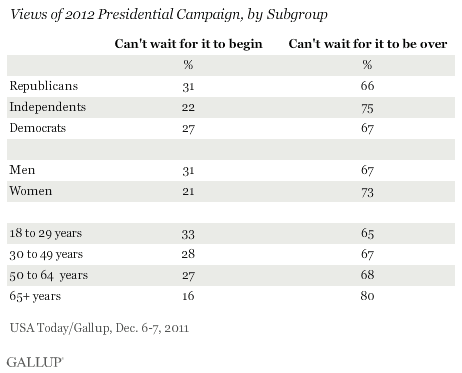PRINCETON, NJ -- With the Jan. 3 Iowa caucuses serving as the kickoff of voting in the 2012 presidential election campaign, Americans would likely prefer to fast-forward to the end of the campaign than watch it unfold. Given a choice, 70% of Americans say they can't wait for the campaign to be over, while 26% can't wait for it to begin.
![Thinking about the 2012 presidential campaign, starting with the Iowa caucuses in January through Election Day in November, which better describes you -- [ROTATED: you can’t wait for the campaign to begin (or) you can’t wait for the campaign to be over]? December 2011 results](http://content.gallup.com/origin/gallupinc/GallupSpaces/Production/Cms/POLL/v19b3j8gv0y3abxnv1cz9q.gif)
These results are based on a Dec. 6-7 USA Today/Gallup poll.
Gallup asked the same question Nov. 30-Dec. 7 of residents in 12 states that are expected to be the most important in deciding the electoral vote outcome -- Colorado, Florida, Iowa, Michigan, Nevada, New Hampshire, New Mexico, North Carolina, Ohio, Pennsylvania, Virginia, and Wisconsin. The eventual nominees are likely to focus their campaign efforts on these 12 swing states, meaning their residents will be bombarded with candidate advertisements, events, and grass-roots outreach.
But even before those efforts have begun in earnest in most of these states, swing-state residents express a slightly higher level of negativity toward the campaign than the overall population, with 75% saying they can't wait for the campaign to be over and 21% saying they can't wait for it to begin.
Republicans, Democrats Equally Negative Toward Campaign
Nationally, there is little difference by party in feelings about the upcoming campaign -- 67% of Democrats and 66% of Republicans can't wait for the campaign to be over.
More generally, all key subgroups look forward more to the campaign's end than its beginning, but some slightly less so than others. For example, men (31%) are more likely than women (21%) to say they can't wait for the campaign to begin.
The greatest differences in feelings toward the campaign are by age. Senior citizens, who have seen more presidential elections than younger Americans, are least likely to be looking forward to the campaign, with 16% saying they can't wait for it to begin. That compares with 27% or more of those in each of the younger age groups.

The same demographic patterns observed at the national level are also apparent among swing-state residents.
Implications
The 2012 presidential campaign is sure to be one of the dominant news stories next year, but for the most part, Americans are not eagerly anticipating it.
There are several possible reasons for the public's antipathy toward the campaign. First, the length of the campaign could be a factor, given that the Republican candidates have been active for much of this year and with roughly 11 months to go before Election Day.
Second, a general distaste for politics and politicians may also be contributing. For example, Gallup in September found 45% of Americans expressing trust in the men and women "who either hold or are running for political office" in this country, a record low, and down 21 percentage points from 2008.
Also, the return of the campaign brings with it the return of negative ads, which may in some ways be effective but also can turn voters off to politics.
Importantly, despite their generally negative feelings toward the campaign, Americans are not necessarily going to tune it out completely, or decline to participate. The same poll finds that 57% of Americans have already given "quite a lot" of thought to the upcoming election, and 72% are at least somewhat enthusiastic about voting in next year's election.
Sign up to get Election 2012 news stories from Gallup as soon as they are published.
Survey Methods
Results for this USA Today/Gallup poll are based on telephone interviews conducted Dec. 6-7, 2011, on the Gallup Daily tracking survey, with a random sample of 1,034 adults, aged 18 and older, living in all 50 U.S. states and the District of Columbia.
For results based on the total sample of national adults, one can say with 95% confidence that the maximum margin of sampling error is ±4 percentage points.
For results based on the total sample of 1,291 swing-state residents (conducted Nov. 30-Dec. 7, 2011), one can say with 95% confidence that the maximum margin of sampling error is ±3 percentage points.
Interviews are conducted with respondents on landline telephones and cellular phones, with interviews conducted in Spanish for respondents who are primarily Spanish-speaking. Each sample includes a minimum quota of 400 cell phone respondents and 600 landline respondents per 1,000 national adults, with additional minimum quotas among landline respondents by region. Landline telephone numbers are chosen at random among listed telephone numbers. Cell phone numbers are selected using random-digit-dial methods. Landline respondents are chosen at random within each household on the basis of which member had the most recent birthday.
Samples are weighted by gender, age, race, Hispanic ethnicity, education, region, adults in the household, and phone status (cell phone only/landline only/both, cell phone mostly, and having an unlisted landline number). Demographic weighting targets are based on the March 2010 Current Population Survey figures for the aged 18 and older non-institutionalized population living in U.S. telephone households. All reported margins of sampling error include the computed design effects for weighting and sample design.
In addition to sampling error, question wording and practical difficulties in conducting surveys can introduce error or bias into the findings of public opinion polls.
View methodology, full question results, and trend data.
For more details on Gallup's polling methodology, visit www.gallup.com.
